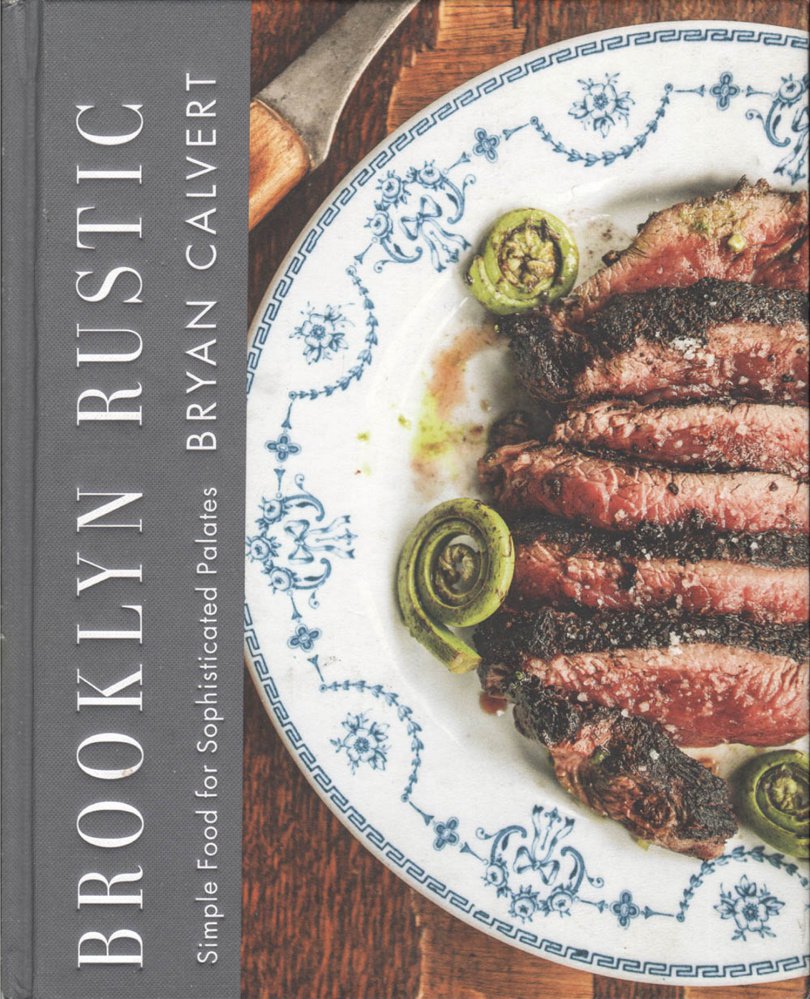“Brooklyn Rustic: Simple Food for Sophisticated Palates.” By Bryan Calvert (with Tammy Walker). Little, Brown and Company. $30.
“Brooklyn Rustic: Simple Food for Sophisticated Palates” is a big, handsome book that would be as at home on the coffee table as in the kitchen. It lays out its philosophy in the introduction: a mix of “country simplicity with urban complexity.” The author, Bryan Calvert, is the chef/proprietor of the restaurant James in, it goes without saying, Brooklyn. He writes how, after the 2008 recession, his restaurant evolved from serving more complicated and expensive special-occasion food: “My strategy shifted from what I should add to the plate to what I should take off.”
The book is filled with beautiful, rustic photos; earnest essays (“A Pantry Full of Mason Jars,” “Perfect Ripeness”); and irresistible-sounding, globe-trotting recipes that capture Brooklyn’s current artisanal, imaginative and on-fire dining scene.
In keeping with the borough’s new farmers-market-centric outlook, the largest section in “Brooklyn Rustic” is devoted to vegetables (Eggplant Fries with Curry Aioli and Baby Blue Hubbard Squash Soup with Blue Cheese and Pickled Pears, to name just two), and in keeping with the borough’s craft cocktail movement, it offers a chapter on cocktails. Chapters on Seafood, Meat, Poultry, Sweets and Basics fill out the book.
I tested six recipes, and based on that sampling, I’m not sure Calvert always hits his mark. Rainbow Chard with Lentils, Apricots and Green Curry, for instance, is an intriguing and delicious combination of flavors, but I made several changes before I was pleased. To begin, the recipe suggests using red lentils, which may offer the prettiest color contrast here, but instantly turned to mush; they are better for making soup. Next, it instructed home cooks to blanch the chopped chard stems in boiling water for 3 minutes, fish them all out, then blanch the leaves for 2 minutes. The second time I made the recipe, I saved myself trouble by starting the stems 1 minute ahead and then blanching the stems and leaves together for 2 minutes. The third time I made it, I wondered why I was blanching the Swiss chard at all – unlike kale, it’s not a tough, fibrous green. Why not simply saute it with the shallot and curry paste and save myself both the pot and the trouble? Yes, this is a quibble, but yes, this is a cookbook that stakes a large part of its claim on simplicity.

Likewise with the Striped Bass Poached in Corn Broth. It sounds fantastic, right? And it bills itself as a “hassle-free meal.” Check and check. Unfortunately, one of the ingredients the recipe calls for is 2 quarts corn broth. I dutifully turned to page 63, where the broth recipe required that I remove the kernels from six ears of corn, toast coriander, simmer the broth for 45 minutes, strain the broth, add the kernels to the broth, then blend the broth. Note to self: The striped bass is “hassle-free” only if I’ve already got the corn broth sitting around. And no doubt, if I ran a restaurant in Brooklyn, my sous chef would have the broth ready and waiting. Alas, in my home kitchen, not.
As for the tasty and easy Blackberry-Basted Pork Tenderloin, I wish Calvert had thought to give me the equivalent of 1 pint fresh blackberries in frozen, which typically are measured in ounces; even with Internet guidance, it was not simple to figure out.
I cannot nitpick with the recipe for Tandoori Chicken, however, which delivered 100 percent on the promise of simple and sophisticated. It was delicious. “Yes!” I scribbled on the page by the recipe.
TANDOORI CHICKEN
The recipe calls for twice as much marinade as necessary and suggests you “refrigerate or freeze the rest for up to one month.” Unless you plan to make the recipe again within the month, you may prefer to simply half the marinade recipe.
Serves 4
Active: 20 minutes
Total: 1 hour, 10 minutes, plus 4 hours to 2 days for marinating
2 tablespoons cumin seeds
2 tablespoons sweet paprika
2 tablespoons smoked paprika
1 tablespoon coriander seeds
1 tablespoon fennel seeds
1 teaspoon whole black peppercorns
1 teaspoon fine sea salt
1/4 teaspoon red pepper flakes
2 garlic cloves, peeled
2 tablespoons peeled and finely chopped fresh ginger
Finely grated zest and juice of 1 large lemon
Finely grated zest and juice of 1 lime
2 cups whole-milk yogurt
1 (31/2- to 5-pound) chicken, cut into 8 pieces (drumsticks, thighs, breasts, wings)
Blend the cumin seeds, sweet and smoked paprikas, coriander seeds, fennel seeds, peppercorns, salt and red pepper flakes in a blender until they become a fine powder.
Add the garlic cloves, ginger, and lemon and lime zests and juice, and blend until smooth. Scrape down the sides with a rubber spatula. Add the yogurt and pulse on and off until all the ingredients are combined.
In a glass bowl or baking dish, thoroughly coat the chicken pieces with half the yogurt marinade (refrigerate or freeze the rest for up to one month for another recipe). Cover and marinate in the refrigerator for at least four hours and up to two days.
Preheat the oven to 325 degrees F. Line a baking sheet with aluminum foil and arrange a roasting rack on top.
Remove the chicken from the marinade, leaving a generous coating on each piece. Place the chicken skin-side up on the roasting rack. Leave at least 1/2 inch between pieces. Spoon any extra marinade from the bowl on top of the pieces.
Roast the chicken until it reaches an internal temperature of 160 degrees F, about 45 minutes. Turn the oven broiler on low and broil the chicken until the yogurt marinade starts to slightly blacken, about 5 minutes. If your oven doesn’t have a broiler crank the oven to 450 degrees F and brown the chicken for about 5 minutes.
Send questions/comments to the editors.




Comments are no longer available on this story